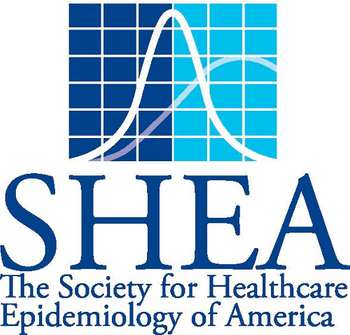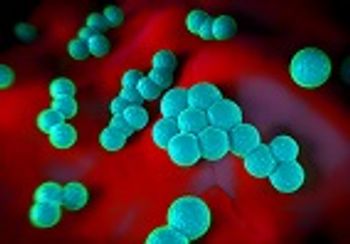
MRSA
Latest News
Latest Videos

CME Content
More News

Contagion® will be covering the conference, and so keep a look out for session coverage, as well as interviews with some of the key presenters.

A multi-institution research team has found that daptomycin is effective and well-tolerated in children.

Duke Health researchers have found that a UVC machine use can reduce transmission of harmful superbugs in hospital settings.

Contagion® takes a closer look at how Staphylococcus aureus infections continue to plague professional sports players.

Daniel Pilch, PhD, associate professor in the Department of Pharmacology at Rutgers Robert Wood Johnson Medical School, co-founder of TAXIS Pharmaceuticals, and co-author of the study, explains the bactericidal behavior of TXA709, a new drug to treat MRSA infections.

Edmond LaVoie, PhD, professor and chair, Department of Medicinal Chemistry, Ernest Mario School of Pharmacy, Rutgers University, co-founder of TAXIS Pharmaceuticals, and co-author of the study on the new MRSA drug, TXA709, explains how TXA709 targets MRSA differently than other antibiotics.

Edmond LaVoie, PhD, professor and chair, Department of Medicinal Chemistry, Ernest Mario School of Pharmacy, co-founder of TAXIS Pharmaceuticals, and co-author of the study on the new MRSA drug, TXA709, discusses the social and economic implications of methicillin-resistant Staphylococcus aureus.

Daniel Pilch, PhD, associate professor in the Department of Pharmacology at Rutgers Robert Wood Johnson Medical School, co-founder of TAXIS Pharmaceuticals, and co-author of the study, explains why MRSA is especially dangerous, and the effectiveness of the team’s new drug, TXA079.


An initiative from the Veterans Health Administration to reduce methicillin resistant Staphylococcus aureus (MRSA) and other healthcare-associated infections in the facilities has led to marked infection reduction around the country.

Michael D. Nailor, PharmD, BCPS-AQ ID, clinical associate professor at the University of Connecticut School of Pharmacy, clinical specialist in infectious diseases at Hartford Hospital, and director of Infectious Disease Residency program at Hartford Hospital, discusses which skin and soft tissue infections (SSTIs) are likely to be drug-resistant.

University of Connecticut researchers have developed novel antibiotic compounds to target methicillin-resistant Staphylococcus aureus infections, offering a potential new drug in the fight against this pathogen.

A new study has characterized risk factors for the development of active methicillin-resistant Staphylococcus aureus (MRSA) among patients who are colonized with the bacteria at hospital admission.

Emergency room providers are misdiagnosing too many patients with cellulitis, according to a new study, causing unnecessary hospitalizations and inappropriate antibiotic use.

Drug maker Melinta has submitted their new antibiotic Baxdela for review by the US Food and Drug Administration, with the hopes that it will bring a new treatment option for people suffering from methicillin-resistant Staphylococcus aureus (MRSA).

Methicillin-resistant Staphylococcus aureus (MRSA) causes more than 11,000 deaths in the United States each year and a new study shows how this pathogen is able to evade last-line antibiotics.

Susan Kline, MD, MPH, associate professor of medicine, Division of Infectious Diseases and International Medicine, medical director for Infection Control, lead physician for Antibiotic Stewardship, at the University of Minnesota, discusses the growing problem of antibiotic-resistance in hospital-acquired infections.

In a recent study in mice, researchers used a synthetic peptide to disrupt the bacterial stress response that causes abscess formation in skin infections with drug-resistant bacteria.

On September 21, 2016, delegates at the 71st meeting of the United Nations (UN) General Assembly gathered to discuss the shared danger of antimicrobial resistance, signaling the global scale of this urgent public health crisis while pledging to collectively tackle the problem of superbugs.

Health officials around the world agree that our one of the best steps to reducing the problem of antimicrobial resistance is scaling back on unnecessary overprescribing of these medications. As doctors in many countries work to implement these efforts, a new report out of the United Kingdom shows some progress in the fight against drug-resistant “superbugs,” along with plenty of work to still be done.

When the colistin-resistant gene, mcr-1, was first found in China in 2015, health officials around the world knew that the gene would inevitably appear in their countries. It has since been detected in other parts of Asia, Europe, and North America, including Canada, which just released a 2016 report from their Canadian Antimicrobial Resistance Surveillance System.

John D'Angelo, MD, senior vice president, executive director of Emergency Medicine Services at Northwell Health, describes how hospital clinicians can identify and treat patients at highest risk for contracting antibiotic-resistant infections.

Nearly a decade ago, 130 Veterans Health Administration facilities around the country introduced their methicillin-resistant Staphylococcus aureus (MRSA) Preventive Initiative to reduce transmission of the “superbug” in their hospitals and health centers.

In a new ruling, the US Food and Drug Administration (FDA) has declared that companies selling over-the-counter antiseptic washes will no longer be allowed to market their products as such due to doubts over these products’ safety and effectiveness.

New research from the Imperial College of London now offers a promising novel approach in the fight against methicillin-resistant Staphylococcus aureus (MRSA), and their findings are decidedly salty.










































































































































